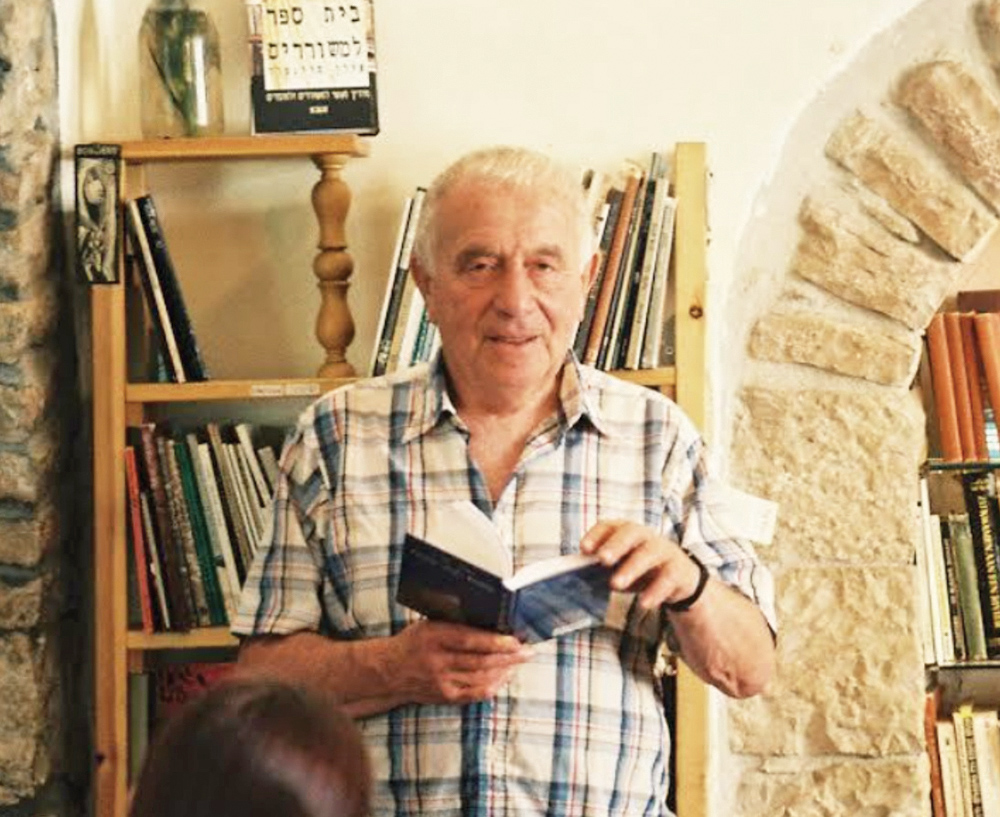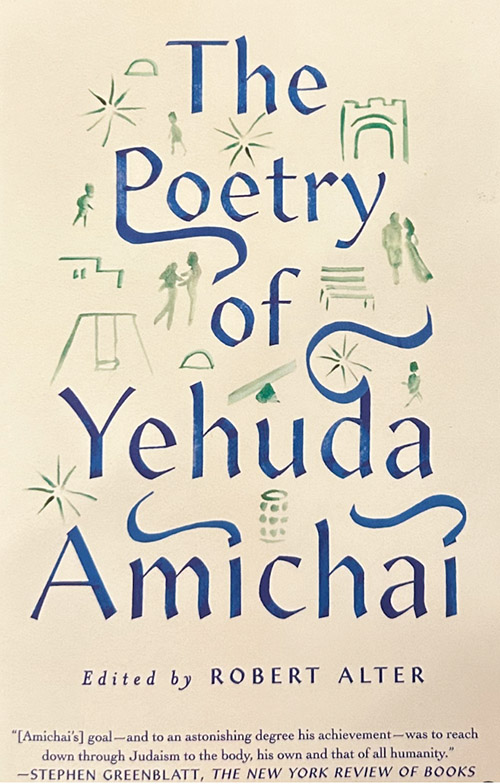I’ve never felt so connected to the idea of Jewish peoplehood as when I explored Amichai’s writing.
Highlighting: “The Poetry of Yehuda Amichai (The Copenhagen Trilogy, Volume 2),” edited by Robert Alter, published by Farrar, Straus and Giroux, 2015. 576 pages. ISBN: 0374235252; ISBN13: 9780374235253, 2017.
Yehuda Amichai is a jewel of the Jewish community, famous for his poetry containing Zionist themes. Born into an Orthodox Jewish family in Germany in 1924, he made aliyah at age 11 in 1935. He attended a religious high school in Jerusalem and then served in the Haganah. It was during his time at the Hebrew University in Jerusalem that he published his first set of poems. Despite being one of the first poets to write in colloquial or modern Hebrew, he is often associated with an older crowd, the Zionists of the 20th century.

Although I am a proud Jewish woman with an insatiable passion for literature, when I heard the name Yehuda Amichai around my house, I initially neglected to engage in his work due to the old-fashioned preconception I had of him. However, mere days before my trip to Israel last summer, my friend gave me “The Poetry of Yehuda Amichai” for my 17th birthday. This collection, published in 2015 and edited by Robert Alter, contains dozens and dozens of translated versions of Amichai’s most famous poems, presented in chronological order. Thus, the over 550-page book joined me and my other 45 pounds of luggage to the Holy Land.
During the rare moments of downtime amidst my jam-packed teen tour, I flipped to a random page of the tome, and every time I did, I was blown away, not only by Amichai’s linguistic prowess but also by how accessible and vibrant the translations were. I saw Amichai’s writing come to life as I experienced Israel through the lens of his verses.
I read about the Jerusalem stone in “Mayor” hours after davening at the Kotel: “And at night the stones of the mountains crawl down / and surround the stone houses.” I read about a young explorer in Israel in “A Tourist in Jerusalem” minutes after I drank cool orange juice at Machane Yehuda: “A girl ripe / like Jericho oranges / with leaves attached / so people will believe / they are fresh.” And I read about a couple braiding challah in the hot Friday afternoon sun in “Love in the Afternoon Before Sabbath,” seconds after I finished helping my friends prepare our own shishi meal: “A braided challah, you and I / in Sabbath love.” These poems perfectly articulated the grandeur of the Holy Land in the physical sense as well as the sensory bliss in the experiential sense.
Amichai’s words permeated my soul. I found the semi-datedness of his pieces to only add to my experience; by experiencing what Amichai had written in real life, I believed that I was perpetuating Jewish culture. Despite Amichai’s death in 2000, his descriptions of the land of Israel have never been more relevant. I felt an immense sense of pride knowing that the natural beauty of Israel had virtually remained untouched since the 1970s and that my peers and I were able to experience the land just as Amichai had described it.
There are three Amichai poems in particular that touched me more than the others. The first poem, entitled “My Father,” which elicits the image of a father who shows his undying love for his family through unassuming acts, reminded me of my own grandfather: “The memory of my father is wrapped in white paper … he pulled out from his little body—love. / The rivers of his hands / poured into his good deeds.” My grandfather, Herman, was a kind, gentle, proud Jewish man who was, above all things, deeply humble and showed his appreciation for me and my family via small acts of kindness like fixing our toys and showing me and brother how to operate his photography equipment. Amichai was able to perfectly capture the importance of subtle love.
The second poem, entitled “If I Forget Thee, Jerusalem” expands upon the popular words from Psalms 137. My youth group read this biblical excerpt all four times that we went to the Kotel and I, likewise, read this poem all four times. Amichai gives commentary on the true significance of these words: “Should my right forget / My left shall forgive, / I shall forget all water, / I shall forget my mother.” According to Amichai, Jerusalem as a place and as a concept triumphs in importance to all other earthly pleasures and necessities. Amichai’s words ringing in my ears made my trips to the Kotel all the more meaningful.

The third and final poem, entitled “Names, Names, in Other Days and in Our Time,” is Amichai’s response to Shakespeare’s “A rose by any other name would smell just as sweet.”. Amichai begins by detailing his own name and how it connects him to his heritage: “Yehudá like ‘thank you’ in Hebrew, todá, a Yehudean pride, / relics of the heroics of Judah the Maccabee. / Yehudá like a resounding oud.” His own name defines his identity.
Later, in the same poem, Amichai talks about the death of Abraham Rubinstein, a boy from his school who was killed in the Holocaust: “If he had stayed in Jerusalem, he would have changed his old / Jewish name / to a proud Hebrew name: Rubinstein would have turned into / Ruby, Stone, Diamond, Sapphire, / any gem would do, no matter what color, any name is a good name.” Amichai is commenting on how changing a name effectively changes one’s destiny.
Amichai then continues by lamenting the death of his childhood friend: “Ruth Ruth, who died in my youth, now the two giants, Yitgadal / and Yitkadash, / Magnified and Sanctified, / will watch over your death / in place of the two other giants, May He Bless and May He Keep / who failed to watch over your life. / Ruth Ruth, thy hallowed name.”
Amichai’s focus on the unique role names have in shaping identity has made me proud to hold a Jewish name that perpetually connects me to the Torah as well as to my family.
Amichai allowed me to explore the beautiful intersection of Judaism and the arts. My experience with his poetry taught me how significant literature can be as an outlet of cultural expression and how it can aid in unifying a people. Most importantly, however, Amichai showed me the beauty of my own Jewish soul.
Dina Shlufman of Tenafly is a Jewish Link summer intern and is a rising freshman at Cornell University.









